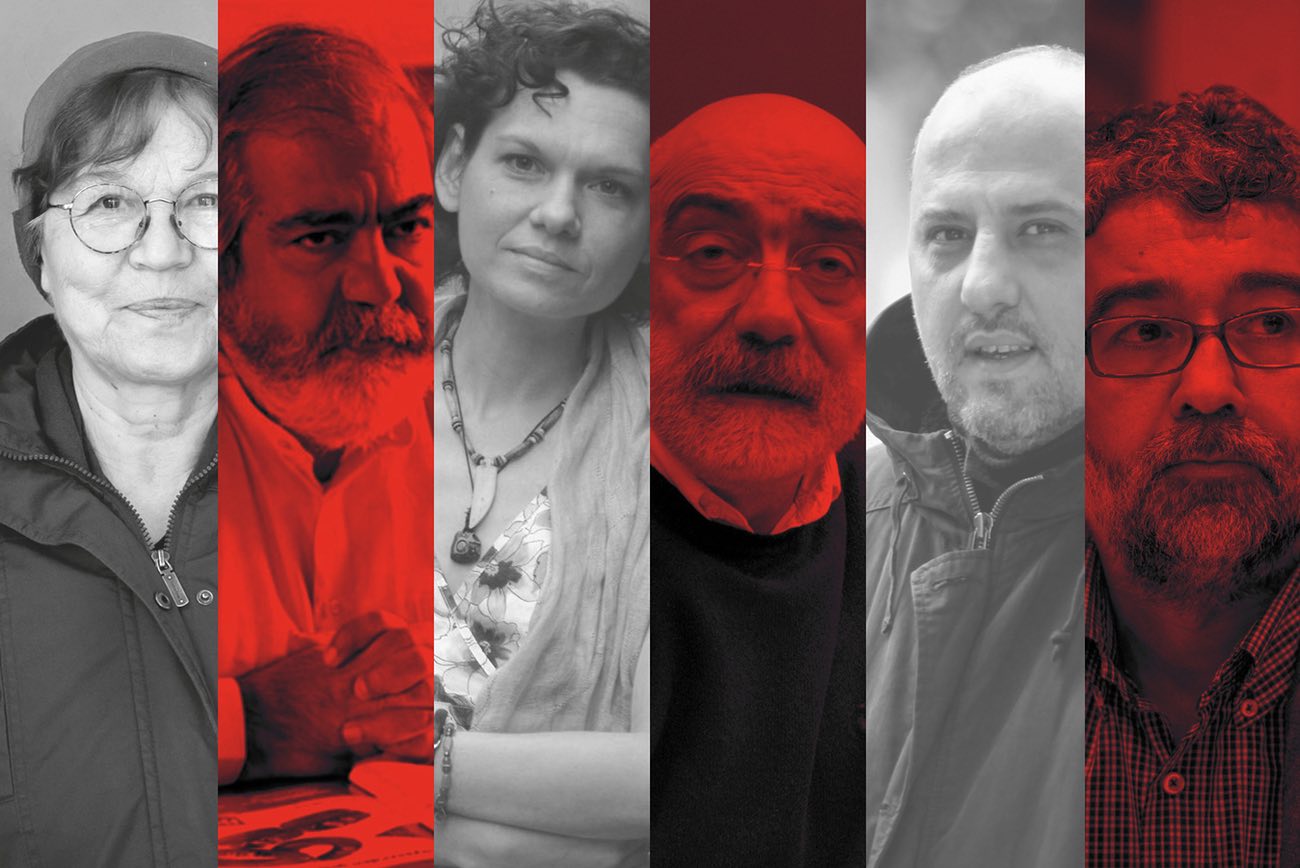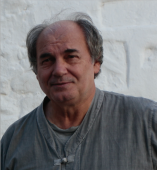Citizens or Clones?
by Tarık Günersel / April 3, 2017 / No comments

Literary critic Necmiye Alpay, economist Mehmet Altan, novelist Aslı Erdoğan, novelist and journalist Ahmet Altan, investigative journalist and writer Ahmet Şık ve journalist Erol Önderoğlu -the Turkey representative of Reporters Without Borders. Image via The Guardian
The continued persecution of artists, academics, and women in Turkey displays how saying “no” to the government is both a powerful and dangerous act. But to speak freely is necessary to maintain one’s identity as human and citizen—the alternative is to become a clone of an oppressive regime.
“Love & Remember” is in Prison
Children practice saying “No!” at an early age. The world might be better if we, the so-called adults, could re-gain that skill. But obeying seems to have a survival value—until it is usually too late.
Imprisoned Linguist Sevan Nişanyan
“No” has been productive (with painful repercussions at times) in the life of linguist and intellectual Sevan Nişanyan, who has been in prison for three years. Nişanyan was convicted of “illegal construction on a historic site,” which is strange because there are skyscrapers illegally built in the heart of Istanbul and their owners do not face prison sentences. His boutique contribution to the touristic village Şirince is something to be thanked for. Nişanyan’s handwritten letter in English addressing a concerned intellectual in the West expresses the situation clearly:
“I have been in jail since January 2nd, 2014, tossed about repeatedly among various units of the Turkish prison system. I was initially admitted to a low-security facility. Then came a number of added convictions, and I was transferred to the horrible high-security prison of Buca (Bu-jah). After a while I managed to get myself into a smaller institution, where I was allowed to use a computer and pursue my linguistic research. (I have been upgrading my Etymological Dictionary to which I added over 9000 text examples from historical sources while in jail.) After completing the statutory time in high-sec, I was once again transferred to a low-sec prison, where it soon became clear that the administration, perhaps motivated by national prejudice, was determined to rid itself of me. In January I was accused of “accessing the internet unlawfully” and committed to solitary confinement for 17 days. I am now once again in a horribly overcrowded and brutal high-sec establishment, where I share a 10-bed ward with 17 other prisoners, including one serial murderer and several serving more-than-lifetime sentences.
As you probably know, I am currently serving four counts of illegal construction and five counts of building in contravention, adding up to 11.5 years. All charges are connected with my work in the village of Şirince (she-reen-ja) , which has been highly praised for preserving and reviving traditional building techniques. Most people here believe that the building infractions have been used as a pretext to punish a series of blogs I wrote in 2012 to defend freedom of expression in religious matters, in which I used mildly disrespectful language about the Prophet of Islam. You must be aware that that sort of language, especially from a member of a non-Muslim minority in a Muslim land, is considered a capital crime in the opinion of many in this part of the world.
Thank you again for your time and attention in this matter.”
I met Sevan Nişanyan around 40 years ago, thanks to the socialist journal Birikim (Accumulation). He considers himself a liberal and keeps improving his vast knowledge. He is open to discussion and contributions in his blog.

- Tarık Günersel is a poet and playwright.
- He studied English Literature at Istanbul University. A self-exile after the military coup in 1980, he spent four years in Saudi Arabia with his wife Füsun and their daughter Barış, teaching English.
- He worked at Istanbul Metropolitan Theater during 1991-2014 as a dramaturg. He proposed World Poetry Day in 1997 which was accepted by PEN International and declared by UNESCO as the 21st of March.
- His translations into Turkish include works by Samuel Beckett, Vaclav Havel and Arthur Miller. His works include The Nightmare of a Labyrinth (mosaic of poems and stories), and How’s your slavery goin’?

- His Oluşmak (To Become), a “life guide for myself,” includes ideas from world wisdom of the past four millennia. Ex-president of PEN Turkey, he was on PEN International Board during 2010-12.
- In 2013 he initiated the Earth Civilization Project with the support of several intellectuals from various parts of the planet.
- He has written the libretti of Selman Ada’s operas. He has recently cooperated with the Israeli composer Daniel Galay: “Dancing Anna Frank” was first performed in Tel Aviv in December 2016. He has acted on stage and screen and directed some of his plays.
A productive and critical intellectual, Sevan Nişanyan should be thanked for disturbing our shallow comfort instead of being kept in prison. He should be rewarded for his contributions to the etymology of the Turkish language, which is a fact beyond any political or ideological discussion.
In Turkish, “sevan” means “love, remember”: Sev, An. Sevan Nişanyan will be loved and remembered by lovers of freedom all over our planet. And before it’s too late, the Ministry of Culture and Tourism should present him with an award on behalf of all the citizens of Turkey.
Did I say citizens? Clones or citizens? The recently imposed reactionary education system, in which there is no room left for philosophy and critical thinking, tends to produce clones rather than citizens.
Suicides of Academies
And two academics commit suicide: Mehmet Fatih Tıraş(34), who signed the Academics’ Peace Manifesto and was expelled from university; Mustafa Sadık Akdağ (also 34),who shot himself after writing a farewell note. Akdağ said he had nothing to do with FETÖ, the Fetullah Terrorist Organization. PEN Turkey Center selected the new book on the expelled academics as the Book of the Month.
Referendum
The Erdoğan-led AK Party government does not want a presidential system like the one you see in the USA or elsewhere. The referendum in Turkey on April 16th will be about pushing the Parliament aside in order to give the legislative, executive and judiciary powers to a single person.
No sultans under the Ottoman Empire had such power. Even during the Independence War of Turkey, Atatürk refused to have such privileges; he always emphasized the leading role of the parliament.
Instead of democracy, the referendum is about legalizing Erdoğan’s autocratic approach. It is about cloning the future generations.
“Yes” or “No!”?
Attacks
An Islamofascist attempted to burn a leading private drama center, Müjdat Gezen Sanat Merkezi after its founder He was caught later on, thanks to the CCTV recording. The founding artistic director of the center, Mr. Gezen, commented: “Nothing can change our decision: We will vote ‘No!’ at the referendum.”
Kırmızı Kedi (Red Cat) is a leading publishing house. One of their bookshops has recently been attacked by two masked men who threatened the people working there. Türkiye Yayıncılar Birliği (The Publishers’ Association of Turkey) protested.
On International Women’s Day, March 8, a group of young men jumped over the wall of the Bilgi University in Istanbul and entered the campus. They then attacked a group of female students, who had prepared a book-stand in favor of women’s rights.
A Feminist Linguist: Sevgi Özel
An inspiring role model, linguist Sevgi Özel, the founding president of The Language Association (Dil Derneği), has been awarded the PEN Duygu Asena Award. Ozel received the award not only for her contributions to the development of the modern Turkish language, but also for her works of fiction and her emphasis on the rights of women and children. Sevgi Özel, whose name means “Love Special” (or “Love is Special”) in Turkish, is among the devoted citizens of the Republic against the attack of fascist neo-Ottomanists. She has also been a defender of the linguistic rights of our Kurdish citizens.
Imprisoned journalist and author, Ahmet Şık
Imprisoned journalist and author Ahmet Şık has been presented with a Solidarity Award by the Contemporary Journalists’ Association, Çağdaş Gazeteciler Derneği (ÇGD). For years, he has been the foremost critic of the Gülenist movement. How can he be in prison because of a connection with that movement?
Neither truth nor justice is important for some rulers. They are ready to do anything to manipulate voters.
“No!” to them.




